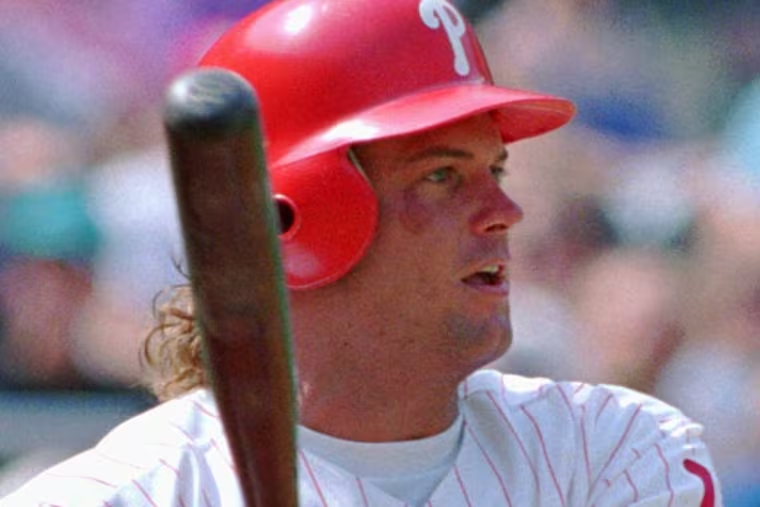Salute to the '93 Phillies
By Rich Westcott In the long history of the Phillies, no team was ever more colorful or more rambunctious than the 1993 National League pennant winners. That team had a cast of characters who performed as well off the field as they did on it.

By Rich Westcott
In the long history of the Phillies, no team was ever more colorful or more rambunctious than the 1993 National League pennant winners. That team had a cast of characters who performed as well off the field as they did on it.
On the field, the '93 Phils were a classic example of the old cliché, "There's no 'I' in team." They won as a team, lost as a team, and never, ever gave up, no matter what the score. They played with relentless determination, and because of that, often came from behind in the late innings to win.
At the time, there were no certified superstars on the Phillies. But the team was loaded with talented, hardworking, everyday players who had come from vastly different backgrounds. Catcher Darren Daulton, the team's acknowledged leader, called the club "a bunch of gypsies, tramps, and thieves."
Many of the players came in trades made by general manager Lee Thomas. Because of their rough-and-tumble style, they were called "throwbacks," a reference to an era when tough, hard play was the norm. "We're throwbacks, all right," first baseman John Kruk quipped. "Thrown back by other organizations."
Spitting, cursing, chewing tobacco, and sipping drinks that were a bit stronger than lemonade were common occurrences. Some called the team "The Broad Street Bellies." They were also described as a raucous, rollicking group of crazy stand-up comedians who knew no boundaries when it came to having fun.
Such an image was only partly true. The '93 Phillies were a blue-collar team that played well, and that was admired by the fans.
"People look at this team and think we're a bunch of loose cannons," manager Jim Fregosi said. "But that's simply not true. We are a team, and no matter what happens, we stay a team because the guys here want to win.
"If crazy is running out ground balls, playing hard, and getting the uniform dirty," Fregosi added, "then, yeah, we're crazy."
No one exemplified the Phillies' desire and determination more than Daulton. An outstanding catcher, as well as a hitter who slugged 24 home runs and drove in 105 in 1993, "Dutch" never quit on the field. Off the field, he presided while plunked in a lounge chair that sat near his locker in the back of the clubhouse.
Dutch had a special cabal, known as the Daulton Gang, which included Kruk, Lenny Dykstra, Dave Hollins, Mitch Williams, and Pete Incaviglia. They dressed in a cluster in an area some called "Millionaires' Row." Each of them, as well as the others on the team, had his own special qualities.
Kruk was a master of the one-liner who hit higher (.316) than any regular on the team. Centerfielder Dykstra was a resourceful team catalyst; third baseman Hollins, a fiercely intense battler; closer Williams, a long-haired ulcer agent; and outfielder Incaviglia, a tough but raucous slugger.
On the pitching staff, Tommy Greene was a quiet country boy with a lively arm. Then there was the insightful Terry Mulholland, the talkative Curt Schilling, the sometimes cantankerous Danny Jackson, gentle Ben Rivera, and team humorist Larry Andersen.
In the outfield, the quietly elegant Jim Eisenreich was everybody's hero because he had fought and overcome Tourette syndrome. The articulate Milt Thompson and the ebullient Wes Chamberlain joined him in the outfield. Wide-eyed rookie shortstop Kevin Stocker, the diligent and highly focused second baseman Mickey Morandini, the refreshing Mariano Duncan, and the underutilized Ricky Jordan manned spots in the infield. Also among the reserves were native sons, future general manager Ruben Amaro and Bristol native Jeff Manto.
The Phillies won the East Division title by three games over the Montreal Expos. Then they beat the Atlanta Braves in a spectacular six-game League Championship Series climaxed by the Phillies' 6-2 win at Veterans Stadium.
The World Series against the Toronto Blue Jays turned out to be a huge disappointment, although the Phillies stayed in the battle until the very end. Two days after the Phils beat the Blue Jays, 2-0, with a sparkling five-hitter by Schilling in Game 5, the end came suddenly and unexpectedly when Joe Carter's three-run homer in the bottom of the ninth overcame a 6-5 Phillies lead and gave Toronto an 8-6 win and the series.
The loss, however, did not erase the otherwise glittering achievements of the '93 Phillies. As this weekend's tribute to that team on its 20th anniversary suggests, that memorable season will forever be regarded as one of the finest, most exciting in Phillies history.